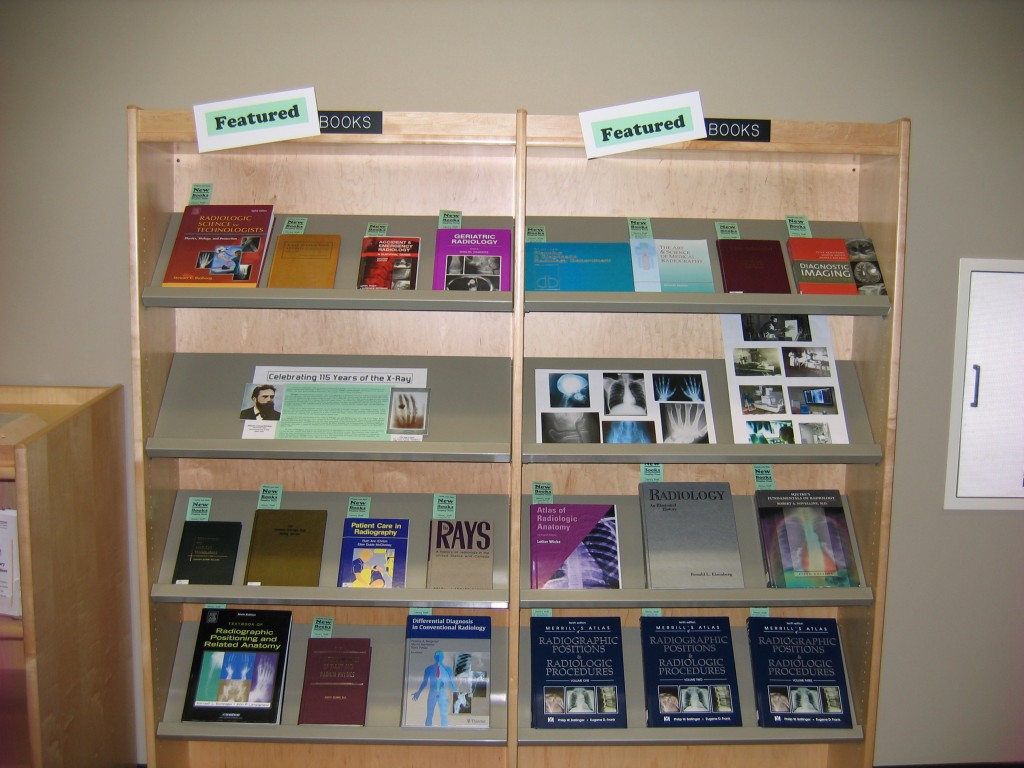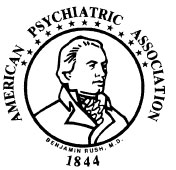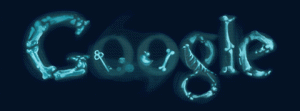Featured Books X-Ray display
 To celebrate the 115th anniversay of the invention of the X-ray, a new display is now available in the library. It features many books on radiology. These books are available for check out.
To celebrate the 115th anniversay of the invention of the X-ray, a new display is now available in the library. It features many books on radiology. These books are available for check out.
 To celebrate the 115th anniversay of the invention of the X-ray, a new display is now available in the library. It features many books on radiology. These books are available for check out.
To celebrate the 115th anniversay of the invention of the X-ray, a new display is now available in the library. It features many books on radiology. These books are available for check out.
 Congratulations to LSUHSC’s Department of Psychiatry, who received a Psychiatric Services Achievement Award for their work with the St. Bernard Family Resiliency Project. This is the top Psychiatric Services honor bestowed by the world’s largest psychiatric organization.
Congratulations to LSUHSC’s Department of Psychiatry, who received a Psychiatric Services Achievement Award for their work with the St. Bernard Family Resiliency Project. This is the top Psychiatric Services honor bestowed by the world’s largest psychiatric organization.
The LSU Health Sciences Center New Orleans Department of Psychiatry was recognized for “successfully integrating mental health services into the school system, youth leadership, and community outreach for children and families recovering from the traumatic effects of Hurricane Katrina,” via the St. Bernard Family Resiliency Project.
Read more about the project in Psychiatric Services 2010 61: 1039-1041
 Check out the Google logo today. In recognizes that Wilhelm Conrad R?Ântgen (commonly spelled Roentgen) accidentally discovered “a new type of ray.” He won the Nobel Prize in 1901 for his discovery, but in physics not medicine.
Check out the Google logo today. In recognizes that Wilhelm Conrad R?Ântgen (commonly spelled Roentgen) accidentally discovered “a new type of ray.” He won the Nobel Prize in 1901 for his discovery, but in physics not medicine.
LSU Health Sciences Center was recently awarded a $3.12 million grant through the U.S. Department of Health and Human Services in order to train more primary care physicians.
An article on gambit.com states “The five-year grant will be used to double the number of primary care doctors trained through the Rural Family Medicine Residency program at LSU’s Bogalusa Medical Center.”
Louisiana has a vast shortage of primary care physicians and statistics are expected to get worse. Congratulations to LSUHSC for working to help our state in this time of need!
With the news that Cholera has taken over 100 lives in Haiti, a National Library of Medicine exhibit on the history of the disease came to mind.
Louisiana has had its own battle with the disease. As recently as 1986, cases of cholera were reported in South Louisiana, including Jefferson Parish. Not to mention the over 4,000 people who died of the disease in New Orleans in 1832.
October 19th was the 67th anniversary of the discovery of streptomycin which proved to be effective against tuberculosis and other penicillin resistant infectious diseases.
African American surgeons, nurses and hospital staff have often been slighted in recognition of providing care for soldiers and civilians during the Civil War. Despite the challenges they faced due to race and gender, they simply downplayed the prejudices?áand carried out their duties as healers and caregivers.?á?áIn hopes to change that, a 6-banner traveling exhibit is making its way around different cities in the U.S. The fight for freedom seemed to be a family affair as some nurses served alongside their relatives. While the war showed opportunity for some, those who received a stipend, others were sent into the field by their owners who kept the money for themselves. One notable mention in the exhibit is Susie King Taylor, who served as a caregiver on the battlefield, yet didnÔÇÖt receive any compensation for her work.
To find a location near you, check out the traveling exhibition. If none are offered locally explore the exhibition online through the educational resources.
Have you ever wondered what it was like to sail the Seven Seas as a medical professional with the navy of the British Empire??á Thanks to the National Archives (UK) you can now get first hand information on the health issues experienced by British sailors as recorded in the journals and diaries of the Royal Navy Medical Officers.
In June 2008, the National Archives won a grant from the Wellcome Trust Research Resources in Medical History program to digitize the records of Royal Navy surgeons and assistant surgeons.?á These journals date from 1793 to 1880 and document the experiences of surgeons serving on Her MajestyÔÇÖs ships and in British naval hospitals, as well as on emigrant and convict ships.
The records, ÔÇ£which include a variety of colourful talesÔÇØ, can be easily searched by diseases, ailments, or names of medical officers or patients (HIPPA does not apply).?á They offer a wonderful insight into the medical practices and challenges faced by medical professionals of a bygone era.
Flu shots will be offered to LSUHSC New Orleans faculty, staff and students during the first week of October, brought to you by the School of Nursing. This year the flu shot will be administered in one dose and will help protect you and others against H3N2, influenza B, and the H1N1 viruses.
Those who should avoid vaccinations are:
What: Flu Shots
When: October 6th, 7th & 8th b/w 9am ÔÇô 2:30pm
Where: School of Nursing ÔÇô Room 5B12 (5th floor)
Cost: $15.00 for faculty & staff; payable to LSUHSC-NO by check or money order (Cost is free for students)
An alphabetical listing of LSUHN Patient Care Providers: Includes specialty, phone number and location of practice.
Bed bugs have been all over the National news and now they are making their way to Louisiana. The LSU Ag Center has published information on bed bugs; the Louisiana State Epidemiologist office has created a 12 page document on the “Control and Prevention of Bed Bugs.”
Got a cabinet full of unused prescription drugs? Well the National Takeback Initiative is going on this Saturday September 25th in hopes to safely dispose of unused and expired prescriptions and over the counter solid dosage medicines. The effort is to bring forth awareness of pharmaceutical controlled substance abuse. These drugs are a potential source of supply for illegal use and an unacceptable risk to public health and safety.
A few recommended disposal options include:
For more information, please visit:
http://www.deadiversion.usdoj.gov/takeback/
http://www.whitehousedrugpolicy.gov/publications/pdf/prescrip_disposal.pdf
In 1884, cocaine was first used as a local anesthesia for eye surgery. Sigmund Freud even endorsed it. At the time it was considered much more useful than ether.

Attention medical geeks and gamers: American Medical news reports on a new role-playing game that teaches infectious diseases.
“Developed by two physician/gamers, Francis Kong and Arun Mathews, Healing Blade plunges the player into a world of sorcery and creatures, where real-world knowledge of infectious diseases and therapeutics play a pivotal role in the winning strategy.”
The print edition, which resembles Magic: the Gathering or Pokemon in game play, retails for $24.99 but is currently sold out at Amazon.com. According to the product’s website, a second printing is underway. Of course, an iPhone application is also in development.
As far as we know, the item will not be available for checkout in the library. However, the library commons is open 24 hours for anyone wanting to start a medical gamer night.
110 years ago today, Major James Carroll, a US Army Physician, “allowed an infected mosquito to feed on him in an attempt to isolate the means of transmission of yellow fever. Carroll developed a severe case of yellow fever, helping his colleague, Army pathologist Walter Reed, prove that mosquitoes transmit this often-deadly disease (from the Library of Congress).” James Carroll is one of the Yellow Fever Commission physicians featured on the Enrique Alferez frieze in the LSUHSC Library Commons. The featured men are Walter Reed, Aristides Agramonte (for whom the Library was originally named), Jesse Lazear, and James Carroll.